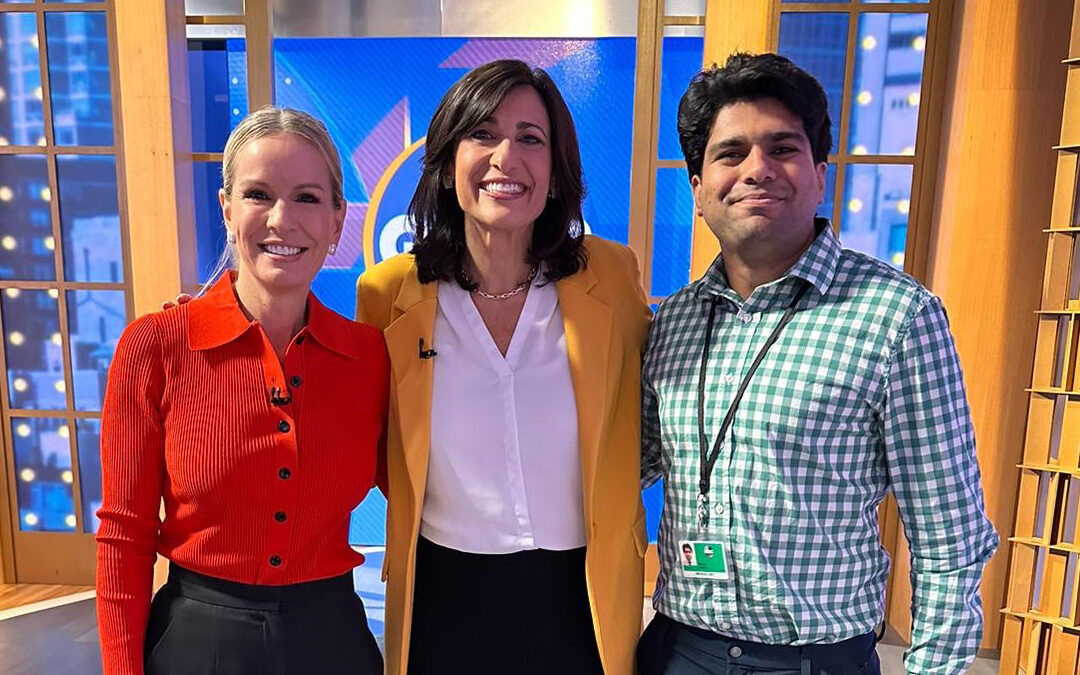Of all the ways to cap a three-year fellowship in hematology and oncology at Rutgers, Faheem Farooq found himself in Times Square Studios, chatting with Rochelle Walensky, the outgoing director of the U.S. Centers for Disease Control and Prevention.
That Tuesday morning, June 20, was near the end of Farooq’s final fellowship rotation – a medical media elective in the ABC News Medical Unit. Walensky was backstage before her appearance that morning on GMA3: What You Need to Know, one of several media interviews leading up to her official departure from the CDC on June 30.
Walensky and her team spent some time chatting with Farooq and his ABC colleagues. “We talked a little bit about communication and messaging and how that’s a challenging thing as science is always changing,” Farooq says.
During his month-long, full-time stint with ABC News, Farooq learned a great deal about communicating medical and scientific research to the public. His job was to write lay-friendly summaries of health-related studies that were then considered for news segments, as well as to review scripts for medical accuracy. His work covered a broad range of topics, such as adolescent sleep patterns, the safety of light alcohol use, and anemia risk from baby aspirin. “It’s been a good experience – fast-paced, challenging, a different way of thinking,” Farooq says.
Farooq, who grew up in Atlantic City and Brigantine, New Jersey, had decided to pursue specialty medical training at Rutgers because the university offered a high-quality program that would bring him closer to home. In 2020, after medical school at the University of Miami and a residency at Stony Brook University in New York, he entered the hematology/oncology fellowship program at Rutgers Robert Wood Johnson Medical School and Rutgers Cancer Institute of New Jersey.
That decision led to Farooq’s traveling nearly 8,000 miles across the Atlantic Ocean and becoming deeply invested in the health of people on another continent. In the fall of 2021, Farooq entered the global oncology fellowship program that is part of the Botswana-Rutgers Partnership for Health. The program provides Rutgers hematology/oncology fellows with a global experience and plays a key role in the partnership’s overall efforts to improve cancer care and prevention in Botswana, Africa, where profound disparities contribute to the country’s cancer mortality rate of over 63 percent.
Rutgers Global Health Institute co-developed the global oncology fellowship program through collaborations with Rutgers Cancer Institute of New Jersey, Robert Wood Johnson Medical School, the University of Botswana, and Princess Marina Hospital in Gaborone, Botswana. The program typically lasts a year and includes a month-long research elective in Botswana. Fellows in the program gain exposure to the realities of cancer care in the country; provide mentorship to junior medical officers, residents, and hospital staff; conduct research; and engage in oncology training and capacity-building initiatives.
Farooq traveled to Botswana in September 2022. In the year leading up to his trip, he assisted in the planning and review of educational materials that were part of the curriculum for Cancer Kitso, a program that responds to Botswana’s critical need for oncology workforce training. During his time in Botswana, he taught a Cancer Kitso lesson for health care professionals in the village of Serowe and observed cancer patient care as part of a rotation at Princess Marina Hospital.
Farooq has since remained involved in the work of the Botswana-Rutgers Partnership for Health. He contributed to a new paper, published recently in PLOS Global Public Health, that addresses the urgent need to improve access to oncology drugs in sub-Saharan Africa.
Having just completed his hematology and oncology training at Rutgers, Farooq will join Penn Medicine’s Princeton Medical Group on August 1. He will be an attending physician in the hematology and oncology department, and he says his global oncology experience influenced his desire to address inequities in cancer care, no matter where in the world he works.
The global oncology fellowship “gave me very important insight on how varied cancer care delivery can be,” he says, noting that some settings are dealing with “a lack of basic drugs that we take for granted and lack of diagnostic testing, compared to being at a cutting-edge academic center with trials and novel therapy. It made me very conscious of the cost of care delivery, equity, how it’s important to get the basics right, and how to effect change – either here or abroad.”
Top photo: ABC News chief health and medical correspondent Jennifer Ashton, former CDC director Rochelle Walensky, and Rutgers global oncology fellow Faheem Farooq pose together backstage on the day of Walensky’s appearance on GMA3: What You Need to Know.

